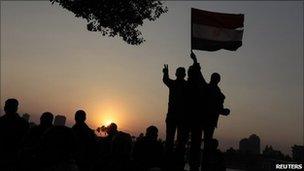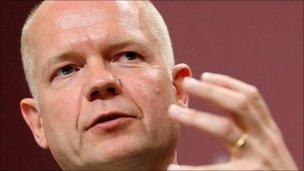William Hague: Britain to push for Iran UN resolution
- Published

The Arab Spring has seen the governments of Egypt, Tunisia and Libya toppled
Britain will push the United Nations for a strong resolution condemning human rights violations in Iran, the foreign secretary has said.
William Hague said Iran's refusal to respond to its people's demands for greater freedom was isolating the country from the rest of the world.
He also accused it of "breathtaking hypocrisy" in claiming to support the Arab Spring revolutions.
Mr Hague added Iran was "completely unwilling" to discuss human rights.
He said the crackdown on the 2009 democracy protests in Iran showed its people wanted a more open government.
The revolutions of the Arab Spring in Egypt, Tunisia and Libya also showed that the desire for human rights and open government was universal and efforts to suppress it in Iran would fail, he said.
"The lessons of the Arab revolutions hold true for Iran just as they apply to repressive countries across the world," he added.
'Legitimate grievances'
"Demands for respect for rights, open government, action against corruption and genuine political participation have and will spread by themselves over time - not because we and other nations advocate them, but because they are the natural aspirations of all people everywhere."

William Hague said the desire for human rights and open government was universal
Mr Hague was speaking at an event sponsored by the Times newspaper to highlight the plight of opposition figures, activists, lawyers and journalists imprisoned in Iran.
He is due to attend the United Nations General Assembly meeting next week.
The foreign secretary added that human rights sanctions on Tehran will be tightened if the regime fails to improve its record.
"We are ready to engage in meaningful and substantive discussion with the Iranian authorities on human rights issues at any time, which they are currently completely unwilling to do.
"Simply refusing to address legitimate grievances about human rights or attempting to stamp them out will fail.
"While some governments across the region are waking up to this truth, Iran is moving in the opposite direction.
"The actions of the Iranian regime are holding Iran back, isolating its people and suffocating their immense potential, and preventing Iran from enjoying normal and productive relations with the outside world."
'Shine a spotlight'
In his speech, Mr Hague cited the cases of former presidential candidates Mir-Hossein Mousavi and Mehdi Karroubi, who have been under house arrest for seven months.
He also mentioned lawyers Javid Kian and Nasrin Sotoudeh, who were detained and accused of acting against national security.
"The international community... has a vital role to play: to shine a spotlight on Iran's human rights record and to hold its authorities accountable.
"Our government is working with its allies, with the media and NGOs to highlight human rights abuses in Iran, to insist that it meets its international human rights obligations and to show those who suffer abuses that their plight has not been forgotten by the outside world."
- Published9 September 2011
- Published29 June 2011